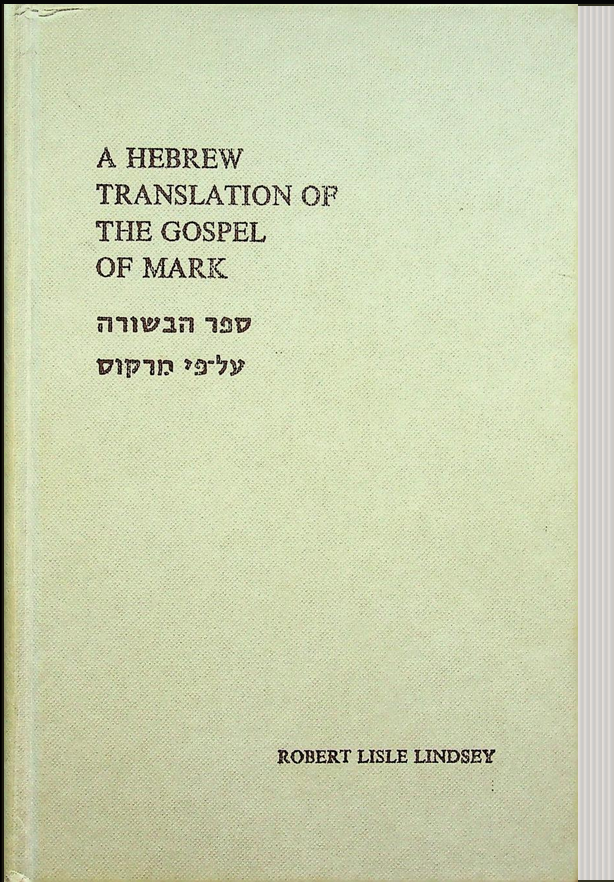 Dr. Lindsey wrote this article in preparation for the press conference that took place in October 1969 upon the publication of his A Hebrew Translation of the Gospel of Mark.[1] This press conference was held at the Baptist House, Narkis Street 4, in the Jerusalem suburb of Rehaviah. The book contains, in addition to the Greek and Hebrew texts of Mark, which Lindsey spent nearly ten years in perfecting, a Foreword by Professor David Flusser of the Department of Comparative Religions at the Hebrew University of Jerusalem and a 76-page English Introduction by Lindsey. Dr. Lindsey wrote this article in preparation for the press conference that took place in October 1969 upon the publication of his A Hebrew Translation of the Gospel of Mark.[1] This press conference was held at the Baptist House, Narkis Street 4, in the Jerusalem suburb of Rehaviah. The book contains, in addition to the Greek and Hebrew texts of Mark, which Lindsey spent nearly ten years in perfecting, a Foreword by Professor David Flusser of the Department of Comparative Religions at the Hebrew University of Jerusalem and a 76-page English Introduction by Lindsey. |
Mark’s Unpopularity
The Gospel of Mark was never popular in the Greek-speaking Hellenistic church. Papias, the mid-second-century bishop of Hierapolis in Phrygia, was the first church father to mention the Gospel and his statement was probably dictated by the general criticism voiced against Mark by the early Greek readers of the Gospel: “Mark,” Papias says, “did no wrong in writing down the things [he had only heard Peter say].”[2]
The order of the four Gospels in the earliest manuscripts often placed Mark at the end of the four, but in any case always secondary to Matthew (as in the modern order). It is now clear that ancient Greek manuscripts of the New Testament like Codex Bezae show a deliberate scribal attempt to revise the text of Mark through harmonization with Matthew and Luke. Mark’s Gospel is not quoted at all by such early writers as Clement of Rome or Ignatius of Antioch, and it was only in the fifth century that Mark even rated a commentator: Victor of Antioch.
Saint Augustine wrote rather contemptuously of Mark as “a camp-follower and abridger” of Matthew.[3] Even in modern times the sections for Sundays and Saints’ Days in the Church of England Prayer Book show only three readings from Mark out of a total of seventy from the Gospels.
Various reasons have been given for Mark’s unpopularity. One is that he was not an apostle like Matthew and John to whom Gospels are credited. Another is that his book does not, like theirs, contain many of Jesus’ longer discourses. Whatever the reasons, Mark’s Gospel was never popular in ancient times.
Paid Content
Premium Members and Friends of JP must be logged in to access this content: Login
If you do not have a paid subscription, please consider registering as a Premium Member starting at $10/month (paid monthly) or only $5/month (paid annually): Register
One Time Purchase Rather Than Membership
Rather than purchasing a membership subscription, you may purchase access to this single page for $1.99 USD. To purchase access we strongly encourage users to first register for a free account with JP (Register), which will make the process of accessing your purchase much simpler. Once you have registered you may login and purchase access to this page at this link:
- [1] Robert L. Lindsey, A Hebrew Translation of the Gospel of Mark. Jerusalem: Dugith Publishers, 1969 (1st ed.); 1973 (2d ed.). xxvi + 162 pp. (Preface to the 2nd ed., pp. v-xxvi. Foreword by David Flusser, pp. 1-8. Introduction, pp. 9-84. Greek text and Hebrew trans., pp. 85-159.) ↩
- [2] Eusebius, Eccl. Hist. 3.39.15. ↩
- [3] De Consensu Evangelistarum 1.2.4. ↩



![Robert L. Lindsey [1917-1995]](https://www.jerusalemperspective.com/wp-content/uploads/userphoto/28.jpg)




























































































